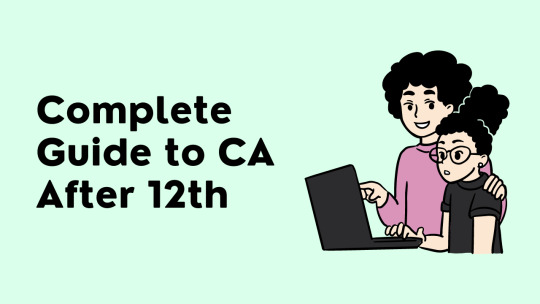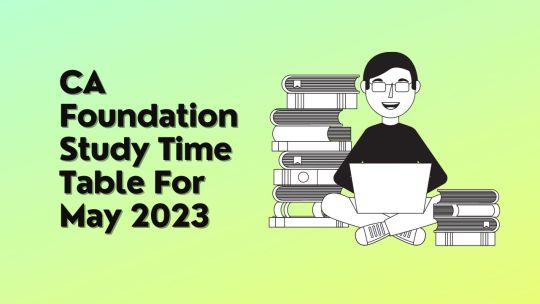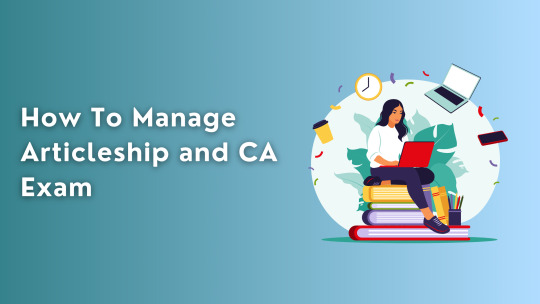#ca intermediate books
Text
Online vs. Offline Study: Which is Better for CA Exam Prep?

For those who want to become accountants, preparing for the Chartered Accountancy (CA) exam is an important step. With so many options at their disposal these days, students frequently struggle to decide between using online and offline study techniques. Each has advantages, and the decision is mostly based on learning preferences and styles. Here, we examine the benefits and drawbacks of each strategy to assist you in selecting the best one for preparing for the CA exam.
The Case for Online Study
1. Accessibility and Convenience:
One of the biggest advantages of online study is accessibility. Students can access study material for CA from anywhere, at any time. This flexibility is particularly beneficial for those balancing work, internships, or other commitments.
2. Updated Content:
Online platforms frequently update their content, ensuring that students have access to the latest CA entrance exam books and study materials. This is crucial for an exam like CA, where the syllabus and regulations can change.
3. Interactive Learning:
Interactive learning tools including discussion boards, tests, and video lectures are available in a lot of online study resources. These can enhance understanding and retention of complex concepts found in CA Foundation books and CA final books.
4. Cost-Effective:
The cost of online resources is frequently lower than that of offline ones. Students can find a plethora of free or reasonably priced books for CA exams and supplementary study materials online.
The Case for Offline Study
1. Structured Learning:
Studying offline offers a more structured setting. Examples of offline study strategies include using physical CA test materials or coaching classes. This can support students in keeping up a regular study routine, which is necessary for in-depth planning.
2. Personal Interaction:
In offline situations, face-to-face interactions with peers and teachers can be quite beneficial. These exchanges provide more individualized instruction, prompt feedback, and doubt clarification.
3. Reduced Distractions:
Distractions that are frequently present when studying online can be reduced by studying offline. Students can concentrate better on their CA entrance exam books and other study materials if they are not distracted by the internet's incessant updates and temptations.
4. Tangible Resources:
For many kids, it's simpler to navigate through real books than digital ones. Studying can be improved by having the capacity to swiftly turn pages, comment, and highlight text.
Combining Both Methods
A combination of methods that blend online and offline study techniques can prove to be the most efficacious for numerous students. Here's how to take advantage of both:
1. Use Online Resources for Supplementary Learning:
Use internet resources to enhance your traditional CA exam materials with additional study. Participate in online forums to discuss issues with peers or watch video lectures to gain understanding of complex subjects.
2. Regularly Update Your Knowledge:
Keep yourself informed about the most recent modifications to the CA syllabus by often visiting internet resources. This guarantees the accuracy of the data in your CA books.
3. Attend Offline Coaching Classes:
To take advantage of supervised instruction and one-on-one time with a coach, sign up for in-person coaching sessions. To reinforce the material you study in these classes, use online resources.
4. Practice with Online Mock Tests:
Utilize online practice exams to gauge your degree of readiness. These exams assist you in identifying areas that require development by simulating the real exam setting.
Conclusion
The question of whether to prepare for the CA exam offline or online ultimately comes down to personal preference. While offline study gives more structure, one-on-one connection, and less interruptions, online study offers flexibility, cost-effectiveness, and access to current content. One can create a thorough and successful preparation strategy by taking a balanced approach that incorporates the best features of both approaches.
#ca final books#study material for ca#books for ca exam#ca foundation books#ca intermediate books#ca entrance exam books
0 notes
Text
Complete Guide to CA After 12th

It can be exciting and difficult to start your road toward becoming a Chartered Accountant (CA) as soon as you finish your 12th grade. You will find all the information you need about the CA course in this all-inclusive guide, which includes eligibility requirements, for your CA Exam preparation.
Eligibility Criteria
To pursue a CA course after 12th, you need to meet the following eligibility criteria:
Educational Qualification: You must have completed your 12th grade from a recognized board.
Minimum Marks: There is no minimum percentage required in the 12th grade to register for the CA Foundation Course.
Course Structure
The CA course is structured in three levels:
CA Foundation: This is the entry-level exam.
CA Intermediate: This level requires deeper knowledge and understanding.
CA Final: This is the last stage before you become a certified Chartered Accountant.
CA Foundation
The CA Foundation Course is the first step in the CA journey. It covers four subjects:
Principles and Practice of Accounting
Business Laws and Business Correspondence and Reporting
Business Mathematics, Logical Reasoning, and Statistics
Business Economics and Business and Commercial Knowledge
To excel in these subjects, it's crucial to refer to the right CA Foundation Books.These books provide a solid foundation and help in understanding the basic concepts.
CA Intermediate
After passing the CA Foundation, the next step is the CA Intermediate Course, which comprises two groups with four papers each:
Group I:
Accounting
Corporate and Other Laws
Cost and Management Accounting
Taxation
Group II:
Advanced Accounting
Auditing and Assurance
Enterprise Information Systems & Strategic Management
Financial Management & Economics for Finance
Using the best CA Intermediate Books is essential to grasp the complex topics covered in this level. These books not only provide in-depth knowledge but also include practical problems to enhance your understanding.
CA Final
The CA Final Course is the ultimate stage. It consists of two groups, each containing four papers:
Group I:
Financial Reporting
Strategic Financial Management
Advanced Auditing and Professional Ethics
Corporate and Economic Laws
Group II:
Strategic Cost Management and Performance Evaluation
Elective Paper (Choose one from Risk Management, Financial Services & Capital Markets, International Taxation, Economic Laws, Global Financial Reporting Standards, Multidisciplinary Case Study)
Direct Tax Laws and International Taxation
Indirect Tax Laws
To succeed in the CA Final, it’s critical to use comprehensive CA Final Books and Study Material For CA. These resources provide detailed explanations, practical problems, and case studies.
Essential Study Materials
Study Material For CA
ICAI provides official study materials for all levels. These materials are meticulously designed to cover the entire syllabus comprehensively. They are essential for understanding the core concepts and for exam preparation.
Scanner CA Books
Scanner CA Books are invaluable for exam preparation. They compile previous years’ question papers along with suggested answers. Scanners help you understand the exam pattern, important topics, and the type of questions frequently asked.
Conclusion
Becoming a Chartered Accountant after the 12th grade is a structured yet challenging journey. With the right approach, dedication, and the best study materials like CA Entrance Exam Books, you can navigate through each level successfully. Remember, consistency and hard work are the keys to achieving your goal of becoming a CA. Good luck!
#books for ca exam#scanner for ca intermediate books#ca entrance exam#ca entrance exam books#ca foundation books#ca intermediate books#study material for ca#ca final books
0 notes
Text
TIPS TO CLEAR THE CA FOUNDATION EXAM
Clearing the CA Foundation Exam requires diligent preparation and a strategic approach. Here are some tips to help you succeed:
Understand the Exam Pattern:
Familiarize yourself with the CA Foundation exam pattern, which includes four papers: Principles and Practice of Accounting, Business Laws and Business Correspondence, Business Mathematics and Logical Reasoning & Statistics, and Business Economics and Business and Commercial Knowledge.
Create a Study Plan:
Plan your study schedule well in advance. Allocate sufficient time to cover all subjects and topics.
Break your study sessions into manageable chunks, and include regular breaks for better retention.
Study Material:
Use the official ICAI study materials and suggested textbooks. These resources are designed to cover the syllabus comprehensively.
Practice Regularly:
Practice solving a variety of problems and questions from each subject. This will help you become comfortable with the exam format and improve your problem-solving skills.
Take Mock Tests:
Take mock tests and practice papers regularly. This will help you assess your progress and identify areas that need improvement.
Time yourself during these mock tests to get a sense of the exam's time constraints.
Focus on Conceptual Understanding:
Instead of rote memorization, strive to understand the underlying concepts. This will make it easier to answer application-based questions.
Revision:
Allocate time for revision in your study plan. Regularly revisiting topics will reinforce your knowledge and improve retention.
Stay Healthy:
Maintain a healthy lifestyle during your preparation. Get enough sleep, eat well, and engage in physical activity to keep your mind and body in peak condition.
Stay Updated:
Keep up with any updates or amendments to the CA Foundation syllabus or exam pattern. Make sure your study materials are current.
Seek Guidance:
If you're facing challenges in understanding certain topics, don't hesitate to seek help from teachers, mentors, or peers.
Join study groups or discussion forums to clarify doubts and share study strategies.
Stay Positive and Manage Stress:
Stay positive and maintain a calm demeanor throughout your preparation.
Practice stress management techniques like meditation or deep breathing to stay focused and relaxed.
Mock Interviews:
Consider participating in mock interviews to improve your presentation and communication skills, which will be useful in the Business Correspondence and Reporting paper.
Remember that CA Foundation is a competitive exam, and success requires dedication and consistent effort. Stay disciplined in your preparation, and don't be discouraged by setbacks. With the right mindset and effective study strategies, you can increase your chances of clearing the CA Foundation Exam. Good luck!
0 notes
Text
5 Steps to Construct a Comprehensive CA Intermediate Study Time Table for May 2023

Preparing for the CA Intermediate Exam in May 2023? Here is a systematic study plan to help you make the most of your time, and ace the exam easily. Follow these 5 simple steps and you'll have all the necessary elements to create a reliable and effective study timetable.
Compile your study material:
The first step of your comprehensive study plan is to compile all the materials you’ll need for the exam. From CA Intermediate books and revision guides to knowledge-based resources, such as lectures and online tutorials, don’t forget to include any other learning materials you may find helpful. Make sure you prioritize studying topics according to their weightage in the syllabus and create a checklist to help track your progress.
With your materials in order, you can start planning your study schedule. Aim to break up long-term goals, like completing each paper and module syllabus into smaller parts, such as individual courses, topics, or chapters. Split things further into daily tasks and assign dedicated study time for each session—this way you’ll be able to track your progress more effectively. Make sure to allot ample time for revision at the end and don’t forget to include a few hours of rest each day to ensure you keep your energy levels up throughout the entire exam period!
Set realistic and achievable goals:
It’s important to stay focused and disciplined while studying, so set realistic goals and break them down into achievable targets. Set an ideal amount of study hours each day and work out how much time it will take you to complete each syllabus topic. Aim for smaller goals and don’t be too hard on yourself if you don’t reach your target! It's also a good idea to review your progress periodically and make any necessary adjustments as needed.
It can be overwhelming when first setting out on a study plan, so build in extra days for any topics you find particularly challenging. You should also set aside some extra study time for practice exams. Taking full length mock tests gives you an idea of the flow and format of the exam, plus it'll help you track your progress. There are some of the best ca entrance exam books which provide the mock test papers samples. Some CA Intermediate candidates even create study plans which include both academic and mental health goals - like devoting two hours a day to physical activity and catching up with friends once a week. This way you can make sure you're taking good care of yourself even as you juggle the demands of Exam preparation.
Divide topics according to importance:
Divide the topics in each syllabus into manageable sections according to their importance, i.e., which ones help you build on other concepts? That way, you can grasp the core point for a better understanding of later topics. Also make sure to read sample questions and model answers to get an idea of the syllabus weightage and level of difficulty. This will enable you to plan your timetable more effectively using efficient learning techniques.
To study for the CA Intermediate Exam in a more manageable way, make a time table which divides available study hours into short sessions according to sections. Study for a maximum of two hours at a stretch and then take a break of 10 – 15 minutes. This break should be used to relax and de-stress your mind. During this break you can do some physical activity or read something that is not related to your studies, like a book. It is important to have proper sleep during this period, so carve out adequate time for sleeping as well.
Schedule regular study sessions:
Allot specific hours each day to study. Make sure you stick to the schedule and set short-term goals so you can measure your progress regularly. Additionally, plan realistic breaks between sessions to help keep you motivated. Scheduling regular study sessions not only helps you make better use of your time but also makes it easier to remember information better.
When creating a study schedule, set aside enough time to cover the entire syllabus and plan for any extra activities such as group discussions and research papers. Also, try not to cram the night before your exams. Lastly, be sure to pick a schedule that works best for you- it should fit your lifestyle and keep you away from getting bored. This way you can make the most of your allotted time and maximize the chances of success in May 2023.
Incorporate rest days and catch-up sessions:
An effective study plan should also include rest days. This means taking a break from studying to help relieve any stress and burnout. On top of that, if you find yourself lagging behind your schedule, consider incorporating catch-up sessions into your study timetable. This allows you to make up for the days when you didn’t manage to complete your goals and can help keep you to be on track with the rest of your studying.
Along with rest days and catch-up sessions, your study time table should also take into account your other commitments such as family time and exercise. Don’t be tempted to overwork yourself by cramming in more hours of studying than is necessary. Estimating how much time you need to cover a topic and then scheduling ‘off’ days will help you structure your studying and ensure that you feel refreshed, motivated, and energized during the course of your studying period.
Conclusion:
In order to succeed in the CA Intermediate Course exam, it is essential to prepare adequately by setting realistic goals and allocating enough time for self-study and revision. Additionally, regular practice tests should be taken in order to measure progress and gain confidence before moving on to new topics. Also, you should study from the best ca intermediate study materials. Finally, taking time out of one's daily schedule to review previously studied material will help individuals perform better on the examination day.
0 notes
Text
Ca Entrance Exam Books | CUET Books | CS | CMA | Scanneradda

CA Foundation Study Time Table For May 2023
You should have a schedule for your CA Foundation studies that includes daily, weekly, and monthly study schedules. Ensure that the study schedule includes portions for the CA Exams Test Series. The CA Foundation test is a requirement for the Chartered Accountancy Course. The exam is the first requirement for becoming a chartered accountant. Currently, passing the Foundation exam is challenging due to the low passing marks and negative marks. Students need to establish a plan for their study time if they want to ace the Foundation exam in the first attempt and also they need to study from one of the best ca foundation books for the best results.
The student who is preparing for CA Foundation benefits from setting specific, well-defined learning objectives. As a result, you should plan your free time as a student in order to give your studies your complete attention.
When preparing for the CA Foundation Course, it is important to analyse and reorganise the syllabus, assign specific time slots to each subject, and plan study sessions in advance. Additionally, taking practice tests can give candidates an insight into how well they are prepared for their upcoming exam. Lastly, allocating sufficient time for revising is critical in order to understand major topics before moving on.
CA Foundation self-study strategy
One can better learn a subject by employing examples that are relevant to him or her personally rather than relying on the lecturer's detailed examples. Create your own self-study schedule and learn at your own pace. Courses are taught at teaching centres at the usual pace, notwithstanding the fact that pupils learn at different rates.
You are not obligated to follow anyone else's schedule or constraints when creating your own self-study timetable for CA Foundation. You can study that subject whenever you choose, without anyone's permission.
Create a customised Study Schedule
A customised study schedule for a CA Foundation student should take into consideration the following factors:
Study pace: Set a realistic pace of studying, taking into account your current workload, level of understanding and how much time you can realistically commit to studying.
Exam date: Plan your study schedule around the date of the CA Foundation exam, making sure you have enough time to cover all the subjects.
Weaknesses: Identify the subjects you struggle with the most and allocate more time for them in your study schedule.
Study resources: Make use of study material from various sources, including best ca entrance exam book, online resources, and past papers.
Breaks and revision: Include regular breaks and time for revision in your study schedule to avoid burnout and consolidate your learning.
Example study schedule:
Day 1-2: 4 hours per day for Economics and Business Studies
Day 3-4: 4 hours per day for Business Laws
Day 5: Revision of Economics and Business Studies
Day 6: Revision of Business Laws
Day 7: Take a break
Day 8-9: 4 hours per day for Accounting
Day 10-11: 4 hours per day for Mathematics and Statistics
Day 12: Revision of Accounting
Day 13: Revision of Mathematics and Statistics
Day 14: Take a break
While making a study timetable, the following things should be focused on:
Goals: Set specific, achievable study goals for each subject, with a focus on areas where you struggle the most.
Time management: Allocate sufficient time for each subject along with allocating time for breaks and revision.
Prioritisation: Prioritise subjects based on their weightage and level of difficulty, allocating more time to the subjects you struggle with the most.
Study methods: Consider different study methods, such as active learning (e.g. practice questions, summarising), and alternate between these methods to keep things interesting.
Realism: Make sure the study schedule is realistic and takes into account any other commitments you may have, such as work or family responsibilities.
Flexibility: Be flexible and adjust the study schedule as needed, based on your progress and level of understanding.
Breaks: Regularly schedule breaks and time for relaxation, to avoid burnout and ensure you are able to maintain focus over the long term.
Guidelines for 1 month study plan for CA Foundation:
Mathematics:
Identify the specific topic you need to study.
Review the basics and essential formulas for the topic.
Allocate time for studying, e.g. 2 hours a day, 5 days a week.
Create a study schedule, breaking down the topic into smaller, manageable sections.
Use different resources, such as textbooks, online tutorials, and practice problems to deepen your understanding.
Solve practice problems regularly to test your understanding and identify areas that need improvement.
Economics:
Start by reviewing the basic principles of economics.
Set a study schedule, allocating time each day or each week to economics.
Practice applying economic concepts by solving problem sets, participating in case studies, or working on projects.
Stay up to date with current economic events and analyse how they relate to the principles studied.
Make flashcards or summarise key concepts and theories in your own words to improve retention.
Consider finding a study group or a tutor to discuss economics with and to receive additional support.
Law:
Allocate specific time slots for studying each subject, taking breaks, and reviewing what you have learned.
Practise active learning techniques such as summarising, asking questions, and explaining the information to someone else.
Join a study group or connect with classmates to discuss and review material, ask questions, and receive feedback.
Apply what you have learned by doing practice questions, writing essays, or taking mock exams.
Keep track of important dates, deadlines, and notes in a planner or an app to stay on top of your studies.
Accounts:
Start with the basics: Ensure that you have a solid understanding of fundamental accounting concepts and principles.
Make a study schedule: Dedicate specific time slots for studying each topic, taking breaks, and reviewing what you have learned.
Use a variety of resources: Utilise textbooks, lecture notes, online tutorials, and practice problems to deepen your understanding.
Practice regularly: Complete practice problems, take mock exams, or work through real-life case studies to apply what you have learned.
Focus on areas of weakness: Identify the areas where you struggle the most and dedicate extra time to studying those topics.
Collaborate with others: Join a study group or connect with friends to discuss and review material, ask questions, and receive feedback.
Stay organised: Keep track of important dates, deadlines, and notes in a planner or an app to stay on top of your studies.
Take breaks: Regular breaks help to refresh your mind and prevent burnout. Take breaks to relax, exercise, or meditate.
Stay up-to-date: Stay informed of recent developments and changes in accounting to maintain a broad perspective and improve your problem-solving skills.
CA Foundation Study Plan for 3 months:
Here's a high-level 3-month study plan for CA Foundation:
Month 1:
Start with the basics of Accounting, Business Laws, and General Economics.
Make brief notes for each subject and revise regularly.
Take mock tests and analyse your strengths and weaknesses.
Month 2:
Focus on strengthening your weak areas and revise all subjects thoroughly.
Start practising problems and take more mock tests.
Give special attention to Accounting, it carries the maximum marks.
Month 3:
Revise all subjects one final time and focus on your weak areas.
Take as many mock tests as possible to build your confidence.
Get clarification on any doubts you have before the final exams.
Conclusion:
Creating a study timetable and following a regular schedule when preparing for the CA Foundation Exam in May is essential. Allocating time to each subject, getting familiar with question types, attending tuition classes, discussing difficult concepts with experienced accountants, studying from some of the best ca entrance exam books and taking practice tests online or through books can help improve chances of success in the exam. Utilising all these resources combined with hard work and dedication will ensure your success.
#cafoundationbooks#CA Entrance Exam Books#CA Foundation Book#CA Intermediate Books#CA Final Books#ca foundation scanner#books of ca foundation
0 notes
Text
Life After CA: What’s Next? Insights from New CAs

Becoming a Chartered Accountant (CA) is a monumental achievement, symbolizing not just academic excellence but also a mastery of the complex world of finance, taxation, and auditing. But once the euphoria of passing the final exams fades, many new CAs find themselves asking, "What’s next?" The journey doesn’t end with earning the title; in many ways, it’s just the beginning. As you transition into your professional career, it’s crucial to stay updated with the latest study material for CA to ensure you continue to build on the knowledge that got you this far. Here’s a look at what life after CA might hold and some insights from those who have recently embarked on this exciting new phase.
1. Choosing the Right Career Path
The beauty of a CA qualification is its versatility. CAs are in high demand across various industries, from banking and finance to consulting, taxation, and corporate law. One of the first major decisions you’ll face is choosing your career path. Do you want to work in a Big Four firm, where you can dive deep into auditing and consulting? Or perhaps a corporate role, where you can be part of a company’s strategic decision-making team? Some may even choose to pursue entrepreneurial ventures, leveraging their financial expertise to start their own business.
To navigate these choices effectively, using resources like the CA Foundation Scanner can be invaluable. It helps you grasp essential concepts and prepare strategically, setting a strong foundation for whichever path you choose in your CA journey.
Insight: "I chose to work with a multinational company in their financial planning and analysis team. It’s challenging, but I love being at the heart of strategic decisions for a newly qualified CA.
2. Pursuing Further Specializations
For those who are passionate about learning, the journey doesn’t have to stop with a CA qualification. Many CAs opt to specialize further by pursuing additional certifications like CFA (Chartered Financial Analyst), CPA (Certified Public Accountant), or even an MBA. These qualifications can open doors to higher-level roles in finance, investment banking, and global business leadership.
Insight: "I realized I wanted to focus more on investment management, so I started working towards my CFA designation. It complements my CA knowledge perfectly," shares who passed his CA exams two years ago.
3. Starting Your Own Practice
For those with an entrepreneurial spirit, starting your own CA practice is an enticing option. Running a practice allows you to be your own boss, choose your clients, and build a business that reflects your values and expertise. However, it also comes with its own set of challenges, including the need for strong business acumen, client management skills, and the ability to stay updated with ever-changing regulations. Utilizing resources like the CA Final Scanner can be invaluable in helping you stay prepared and informed, ensuring that your practice adheres to the latest standards and practices.
Insight: "Starting my own practice was daunting, but it’s incredibly rewarding. Every client is a new challenge, and I love the variety in my work who launched her practice a year ago.
4. Balancing Work and Life
One of the most significant transitions from CA student to professional is learning to balance work and life. The intense study schedules are behind you, but now you face the demands of a full-time job, often with long hours and high expectations. It’s essential to find a balance that allows you to grow in your career while also enjoying personal time and pursuing hobbies.
Insight: "The first few months were tough. I had to remind myself to take breaks and enjoy life outside of work. Now, I make time for my hobbies and feel much more balanced," notes a CA who has been in the workforce for six months.
5. Networking and Continuous Learning
Even after becoming a CA, continuous learning and networking are crucial for career growth. Attending seminars, workshops, and networking events can help you stay updated with industry trends and connect with peers and mentors who can guide your career. Additionally, referring to CA entrance exam books can be a great way to refresh foundational knowledge and stay sharp in your field.
Insight: "I’ve found that networking is key. It’s not just about what you know, but also who you know. Building relationships with others in the field has opened many doors for me who actively participates in CA forums and events.
Conclusion
Life after CA is filled with opportunities, challenges, and the potential for immense growth. Whether you choose to specialize, start your practice, or climb the corporate ladder, the skills and knowledge you’ve gained as a CA will serve as a strong foundation. The journey ahead is exciting, and with the right mindset and continuous learning—such as staying updated with the latest Books for CA Exam—the possibilities are endless. Remember, becoming a CA was just the beginning—what you do next is where the real adventure begins.
0 notes
Text
Importance of Mock Test Papers in CA Exam

It can be a difficult task to study for the CA tests; it calls for a great deal of commitment, careful planning, and persistent work. Mock exam papers are special among the many tools and resources accessible. Students can gain essential insights and preparation from these simulated exams, which are meant to match the settings of the real CA exams. This blog explores the value of practice examinations and how using them may greatly improve your preparedness for the CA exams.
Understanding the Exam Pattern
Mock test papers help students become familiar with the format of the CA exam, which is one of its main advantages. Students can become proficient at comprehending the kinds of questions offered, how marks are distributed, and how much time is allotted by practicing with these papers on a regular basis. Students who are familiar with the material have less worry and can approach the exam with more clarity and confidence.
Self-Assessment and Progress Tracking
Mock exams are a great resource for self-evaluation. They assist pupils in determining their strengths and shortcomings as well as their level of preparation. Students might identify particular areas that need greater attention and effort by examining how they performed on these assessments. This focused method of studying guarantees a more successful and productive preparatory procedure.
For instance, using resources like CA Entrance Exam Books and Scanner CA Intermediate Books in conjunction with mock tests can highlight which sections need more revision or practice. This way, students can allocate their study time more judiciously, ensuring a well-rounded preparation.
Time Management Skills
The CA exams heavily weight time management, and practicing with mock test questions is a great way to improve this ability. These exams force students to finish the paper within the allotted time because they mimic the real exam setting. Through practice, students can learn how to give each section and question the proper amount of time, which will help them finish the test quickly.
Using Scanner CA Foundation Books and CA Foundation Scanner can provide additional practice problems that reinforce these time management skills. The more students practice under timed conditions, the better they become at managing their exam time effectively.
Boosting Confidence
Exam performance is significantly influenced by confidence. A student's confidence can be greatly increased by consistently taking practice exams. Students feel more prepared and accomplished when they watch their results rise over time. This self-assurance is essential when taking the test because it lowers exam anxiety and improves performance in general.
Practical Application of Knowledge
Mock test papers offer a practical way to apply theoretical knowledge. While studying from Scanner CA Final Books and other study materials is essential, it is equally important to apply that knowledge in an exam-like scenario. Mock tests bridge this gap by providing students with opportunities to practice problem-solving and analytical thinking, skills that are vital for success in the CA exams.
Feedback and Improvement
Mock exam feedback is quite helpful. Precise answers and clarifications assist learners in understanding their errors and acquiring the proper methodology for addressing problems. By encouraging learning and progress, this ongoing feedback loop makes sure that pupils don't make the same errors on the real test.
Conclusion
Mock test papers are essential for preparing for the CA exam since they offer a realistic exam environment, assisting students in time management and lowering exam anxiety. They direct concentrated study efforts by highlighting areas for improvement and areas of strength. Frequent mock test practice improves accuracy and speed of problem solving, acquaints pupils with exam formats, and increases self-assurance. In the end, mock tests are very helpful in planning and honing exam strategies, which greatly raises the likelihood of passing the CA exams.
#scanner ca intermediate books#scanner ca final books#ca entrance exam books#books for ca exam#study material for ca#ca intermediate scanner
0 notes
Text
How to Stay Motivated Throughout Your CA Exam Journey

Embarking on the journey to become a Chartered Accountant (CA) is no small feat. It demands immense dedication, hard work, and resilience. Staying motivated throughout this journey can be challenging, but it is crucial for success. Utilizing resources like the CA Intermediate Scanner can significantly aid your preparation. Here are some effective strategies to help you maintain your motivation from the beginning to the end of your CA exam journey.
1. Set Clear Goals
Having clear, specific goals can provide a sense of direction and purpose. Break down your long-term goal of becoming a CA into smaller, manageable milestones. For instance, focus on passing individual exams, mastering specific subjects, or completing study modules. Celebrate each milestone you achieve, as this will give you a sense of accomplishment and keep you motivated to tackle the next one.
2. Develop a Study Plan
A well-structured study plan is essential for staying on track. Allocate specific times for studying, breaks, and revisions. Ensure that your study plan is realistic and includes time for relaxation and hobbies. By following a routine, you can avoid last-minute cramming and reduce stress. Stick to your plan as much as possible, but also be flexible enough to make adjustments when necessary.
3. Stay Organized
Keeping your study materials and notes organized can save you time and reduce frustration. Use folders, binders, or digital tools to categorize your study materials by subject or topic. A clutter-free study environment can help you focus better and enhance your productivity.
4. Find Your Study Style
Everyone has a unique study style that works best for them. Some people prefer studying alone, while others benefit from group study sessions. Experiment with different methods such as visual aids, flashcards, or practice tests to find what suits you best. Understanding your study style can make your study sessions more effective and enjoyable.
5. Take Care of Your Health
Maintaining good physical and mental health is vital for staying motivated. Ensure you get enough sleep, eat a balanced diet, and exercise regularly. Taking short breaks during study sessions can help refresh your mind. Practice mindfulness or meditation to manage stress and keep a positive mindset.
6. Seek Support
Having a support system can make a significant difference in your CA exam journey. Connect with fellow students, join study groups, or seek guidance from mentors or teachers. Sharing your experiences, discussing challenging topics, and getting moral support can boost your motivation and help you stay focused. Additionally, using resources like the CA Foundation Scanner can provide valuable practice and enhance your preparation.
7. Stay Positive
It is normal to encounter setbacks and challenges during your CA journey. Instead of getting discouraged, view these obstacles as learning opportunities. Stay positive and remind yourself why you started this journey. Visualize your success and the benefits of becoming a CA. Keeping a positive attitude can help you overcome difficulties and stay motivated.
8. Reward Yourself
Rewarding yourself for your hard work and achievements can be a great motivator. Treat yourself to something you -after completing a study session or passing an exam. It could be a movie, a meal at your favorite restaurant, or a short trip. Additionally, investing in helpful resources like Scanner CA Final Books can further boost your preparation. Rewards provide a sense of accomplishment and make the journey more enjoyable.
9. Stay Updated
Staying updated with the latest developments in the CA field can keep you motivated and informed. Follow industry news, attend seminars or webinars, and read relevant articles or blogs. Being aware of the opportunities and advancements in your field can reinforce your commitment to becoming a CA.
10. Reflect on Your Progress
Regularly take time to reflect on your progress. Assess what you have accomplished so far and identify areas that need improvement. Reflecting on your journey can provide insights into your strengths and weaknesses, helping you make necessary adjustments and stay motivated.
ConclusionStaying motivated throughout your CA exam journey is crucial for success. By setting clear goals, developing a study plan, staying organized, taking care of your health, seeking support, staying positive, rewarding yourself, staying updated, and reflecting on your progress, you can maintain your motivation and achieve your goal of becoming a Chartered Accountant. Incorporating resources like Scanner CA Foundation Books can help streamline your preparation and provide targeted practice. Remember, the journey may be challenging, but the rewards are well worth the effort. Keep pushing forward and believe in yourself!
#scanner ca intermediate books#scanner ca foundation books#scanner ca final books#ca foundation scanner#ca entrance exam books
0 notes
Text
Deciding whether an Account Book for CA Intermediate is right for you depends on your specific needs, learning preferences, and study habits. Here are some factors to consider:Get more information please read this blog:
0 notes
Text
How To Manage Articleship and CA Exam

It can be difficult to balance articleship preparation with CA test preparation. However, both may be managed successfully with the correct tactics and tools. Here are some pointers for balancing articleship responsibilities with CA test preparation.
1. Create a Realistic Study Schedule
Making a realistic study schedule is one of the first stages to manage your articleship and CA test preparation. Determine when you work and set aside time just for studying. Cover the more serious elements of the syllabus throughout the weekends and vacations. In order to prevent burnout, make sure you take pauses.
2. Utilize the Best CA Books
Investing in high-quality study materials can significantly enhance your preparation. For the CA Intermediate level, CA Intermediate Books are crucial. These books are designed to cover the entire syllabus comprehensively and provide a solid foundation. Similarly, for beginners, it is essential to build the basics. As you progress, CA Final will be indispensable for advanced topics like CA Final Books , Study Material etc are those things.
3. Prioritize Your Tasks
It's critical to efficiently prioritize your chores when you're short on time. Concentrate on practical areas and gain knowledge from real-world applications during your articleship. Concentrate your study efforts on the subjects that are most important and will be tested on them. Utilize Books for CA Exam to identify key areas and prioritize accordingly.
4. Make Use of Study Material
Apart from standard textbooks, make use of additional Study Material For CA. Practice guides, review tests, and suggested responses from earlier exams are all included in this. These materials aid in practice a range of questions and offer insight into the exam format.
5. Stay Consistent
The secret to juggling articleship with CA test preparation is consistency. No matter how busy you are, set aside time every day for studying—at least a few hours. Maintaining regular study habits will help you stay on schedule and prevent last-minute scrambling.
6. Join Study Groups
Getting involved in a study group can be very helpful. Engaging in peer discussions on various themes may lead to a deeper understanding of the subjects as well as alternative viewpoints. Study groups also support maintaining responsibility and motivation.
7. Seek Guidance from Seniors and Mentors
Never be afraid to ask mentors and seniors who have completed their articleships and passed the CA examinations for advice. They can offer moral support, the greatest CA Books recommendations, and insightful advice.
8. Leverage Online Resources
There are a ton of internet tools available in today's digital age to help you prepare better. Video lectures, webinars, and online courses can offer more clarification on difficult subjects. For the CA exams, a variety of platforms provide study guides that include interactive sessions and mock exams.
9. Take Care of Your Health
While focusing on studies and articleship, do not neglect your health. A healthy mind and body are essential for effective studying. Ensure you get adequate sleep, eat nutritious food, and incorporate some form of physical activity into your daily routine.
10. Practice Time Management
Time management that works is essential. Divide up your study periods into smaller, more manageable halves, and utilize focus-boosting strategies like Pomodoro. To increase your speed and accuracy, practice answering questions in the allotted time by using the CA Exam books.
Conclusion
It takes careful time management, consistent study habits, and utilizing real-world experience to prepare for the CA tests in addition to an articleship. To thrive in both, set priorities for your career, look for guidance, and keep a healthy work-life balance. Relentlessness and consistency are essential for reaching your CA objectives.By following these strategies and making the most of the available CA Books and CA Entrance Exam Books, and , you can effectively manage your articleship while preparing for your CA exams. With dedication and smart work, achieving the coveted CA title is within your reach.
#ca final books#study material for ca#books for ca exam#ca intermediate books#ca entrance exam books#ca foundation books#studymaterialforca#study material
0 notes
Text
Navigating the New Scheme for Education and Training in CA Final Course

It's important to stay updated with resources and educational programs in the continuously changing rule of chartered accountancy (CA). The updated syllabus brought forth by the New Scheme for Education and Training aims to equip aspiring chartered accountants for the evolving demands of the business. In this blog post, we'll go over the key components of the new strategy, discuss recommended reading lists, and provide tips on how to perform well on the CA Entrance Exam.
Understanding the New Scheme for Education and Training
The New Scheme for Education and Training in CA represents a strategic shift towards a more practical and application-oriented approach. It emphasizes real-world scenarios, case studies, and hands-on learning to prepare candidates for the complexities of modern accounting and finance practices. The scheme comprises three levels: Foundation, Intermediate, and Final.
Navigating the CA Entrance Exam Successfully
The CA Entrance Exam serves as the gateway to the profession, assessing candidates' aptitude and readiness to pursue the CA course. Here are some tips for navigating the entrance exam successfully:
Understand the Exam Pattern: Familiarize yourself with the format and structure of the entrance exam, including the number of questions, duration, and marking scheme.
Create a Study Plan: Develop a structured study plan that allocates sufficient time for each subject. Prioritize areas of weakness while ensuring comprehensive coverage of all topics.
Practice Regularly: Regular practice is key to mastering the concepts tested in the entrance exam. Solve sample papers, attempt mock tests, and utilize CA Entrance Exam books to enhance your preparation.
Seek Guidance: Don't hesitate to seek guidance from experienced mentors, tutors, or fellow aspirants. Joining a coaching institute or online study group can provide valuable insights and support.
Stay Updated: Stay informed about any modifications or revisions to the ICAI's syllabus or test design. For the most recent information, subscribe to relevant publications or internet forums for discussion.
Latest Updates on ICAI New Scheme
The Institute of Chartered Accountants of India (ICAI) has released the updated syllabus for the CA Final course, applicable from May 2024. This new syllabus, under the new scheme of education and training, aims to better equip aspiring Chartered Accountants with the skills and knowledge needed in the dynamic field of accounting and finance.
Overview of the New CA Final Syllabus
The updated syllabus for the CA Final course consists of six papers, streamlined from the previous eight. This change aims to focus on core areas and eliminate redundancy. Each paper is designed to cover a comprehensive range of topics essential for the professional competence of future CAs.
Group I
Paper1:FinancialReporting
Focuses on Indian Accounting Standards (Ind AS), group financial statements, and financial instruments.
Key topics include Business Combinations, Consolidation, and Ind AS specific requirements.
Paper2:Advanced Financial Management
Covers strategic financial management, risk management, security valuation, and portfolio management.
Includes topics like derivatives, foreign exchange exposure, and mergers and acquisitions.
Paper3:Advanced Auditing and Professional Ethics
Deals with comprehensive direct tax laws including recent amendments and international taxation principles.
Topics include transfer pricing, BEPS, tax treaties, and taxation of digital transactions.
Group II
Paper4:Direct Tax Laws & International Taxation
Deals with comprehensive direct tax laws including recent amendments and international taxation principles.
Topics include transfer pricing, BEPS, tax treaties, and taxation of digital transactions.
Paper5:Indirect Tax Laws
Focuses on GST and Customs Law.
Key areas include supply, charge of GST, input tax credit, and procedures for import and export under GST.
Paper6:Integrated Business Solutions
A multi-disciplinary case study paper that includes strategic management and business solutions.
This paper requires the application of knowledge from all other subjects in practical scenarios.
Recommended Study Materials for CA Final Exam
Preparing for the CA Final examination requires access to high-quality study materials that cover the entire syllabus comprehensively. Here are some recommended resources
CA Final Books: A curated selection of textbooks authored by renowned experts in the field. These books provide in-depth coverage of each subject and serve as essential reference materials for exam preparation.
Scanner CA Final Books: Scanners are invaluable tools for CA aspirants, offering a collection of past exam questions categorized topic-wise. Practicing with scanners helps candidates familiarize themselves with the exam pattern and refine their problem-solving skills.
Study Material for CA Final Books: The Institute of Chartered Accountants of India (ICAI) provides official study materials for CA Final aspirants. These materials are meticulously crafted to align with the exam syllabus and often include case studies, illustrations, and practice questions to aid comprehension.
CA Entrance Exam Books: For candidates preparing for the CA entrance exam, a comprehensive guidebook covering mathematics, logical reasoning, and General Awareness is essential. These books help build a strong foundation in the subjects tested, ensuring thorough preparation and enhancing the chances of success in the exam.
Conclusion
The New Scheme for Education and Training in CA provides a modern way to prepare future Chartered Accountants for their professional challenges. By using the recommended study materials and effective study strategies, students can confidently and ability to navigate their CA journey. With hard work and dedication to success in the CA Entrance Exam and beyond is achievable.
#ca entrance exam#scanner for ca intermediate books#books for ca exam#ca entrance exam books#study material for ca#ca intermediate books#ca foundation books#ca final books
0 notes
Text
Unveiling the New Syllabus for CA Inter: Navigating the Path to Financial Brilliance
Introduction
In the dynamic world of finance and accounting, staying aligned with the latest syllabus is paramount for aspiring Chartered Accountants (CAs). The CA Inter course holds a pivotal position in this journey, and the introduction of a new syllabus brings both excitement and anticipation. In this blog post, we will delve into the details of the CA Inter new syllabus, unveiled to shape the financial wizards of tomorrow.
The Essence of Change
Change is the cornerstone of progress, and the revamped syllabus for CA Inter exemplifies this philosophy. The new syllabus has been meticulously designed to equip students with a comprehensive understanding of the contemporary financial landscape. With a focus on practical application and a wider knowledge horizon, the changes aim to nurture future CAs who are not just well-versed in theory, but also adept at solving real-world financial challenges.
1. Blending Theory with Application
One of the noteworthy changes in the new syllabus is the heightened emphasis on practical application. While theoretical knowledge remains crucial, the syllabus encourages students to bridge the gap between concepts and their real-world implementation. This shift is a testament to the evolving demands of the financial sector, which seeks professionals who can seamlessly translate theory into effective action.
2. Holistic Approach to Finance
The new syllabus takes a holistic approach by integrating diverse financial subjects. This broader perspective enables students to comprehend the interconnectedness of different financial elements, preparing them to make informed decisions that impact organizations on multiple fronts.
3. Skill Enhancement
In the ever-evolving financial landscape, technical skills are invaluable. The revised syllabus acknowledges this reality by incorporating topics that enhance students' proficiency in data analysis, technology utilization, and communication. These skills are vital for CA Inter students who aspire to thrive in an era defined by digital transformation.
4. Case Studies and Real-Life Scenarios
To foster analytical thinking and strategic decision-making, the new syllabus incorporates case studies and real-life scenarios. By immersing themselves in these practical exercises, students develop the ability to dissect complex financial situations and propose effective solutions – a skill set that differentiates exceptional CAs.
Navigating the Path to Success
The journey through the new CA Inter syllabus demands strategic planning and effective study methodologies. Here are some strategies to guide students toward success:
1. Structured Study Plan
Devise a comprehensive study plan that allocates ample time to each subject. Start early to avoid last-minute rushes and ensure a thorough understanding of all topics with the help of some of the best CA Intermediate Books.
2. Application-Oriented Practice
Given the focus on practical application, dedicate time to solving real-life scenarios and case studies. This hands-on practice hones your problem-solving abilities and reinforces theoretical concepts.
3. Embrace Technological Resources
Leverage digital resources and technology platforms to enhance your learning experience. Online tutorials, simulation tools, and interactive quizzes can augment your understanding of complex concepts.
4. Collaborative Learning
Engage in study groups or online forums to exchange insights and ideas. Collaborative learning exposes you to different perspectives and strategies, enriching your approach to problem-solving.
Conclusion
The introduction of the new syllabus for CA Inter heralds an exciting era in the journey toward becoming a Chartered Accountant. Embracing change is pivotal to growth, and this curriculum transformation reflects the profession's commitment to staying relevant in a swiftly changing financial landscape. By embracing practical application, holistic understanding, and enhanced skills, CA Inter students can navigate this path with confidence and emerge as financial luminaries poised to make a profound impact on the world of finance.
0 notes
Text
1 note
·
View note
Text

King Herihor before the Two lions of the Aker deity, representing “Today” and “Tomorrow”. A personification of the horizon, Aker was a deity of the Earth and Underworld, believed to guard both the eastern and western horizons (Bakhu and Manu).
Book of the Dead of Nodjmet
Third Intermediate Period, 21st Dynasty, ca. 1069-945 BC.
Now in the British Museum. EA10541
Read more
182 notes
·
View notes
Text
Virginity & Marriage in Medieval Times — The “Virginity Test” and How Women “Cheated” Such Tests.

Berthold Furtmeyr, The Tree of Death and Life, Munich, Germany, 1489
Throughout the ages, a woman’s virginity was a highly prized attribute and a symbol of purity. Women were expected to be free from the stain of the sin of sex before marriage. It was impossible for a woman to lose her virginity before marriage and be considered “holy” but unsurprisingly, this standard did not exist for men. Medieval Christianity told women that, as the daughters of Eve, they are responsible for the fall of mankind due to their innate sin and this heavily influenced ideas of women’s sexuality–including the importance of virginity before the holy sacrament of marriage.
As we know, you were expected to be a virgin when getting married for the first time, and to prove that the woman was indeed a virgin, they inspected the bedsheets for blood after the consummating of the marriage. (I would of been shamed/exiled/killed/whatever punishment they laid upon me back then as I did not bleed my first time 😂)

Miniature from Le livre appelle Decameron by Giovanni Boccaccio, 1460s
What we know about the female body and modern medicine now, is that you don’t always bleed during your first time—that the hymen doesn’t always stretch/tear from your first time having sex. It can happen earlier on in life from various things, you could be born without a hymen or you could have a hymen that just doesn’t bleed, as the hymen doesn’t necessarily “tear”, it usually stretches because the hymen is a thin wall of membrane that extends across the vaginal opening but it usually has an opening (a “hole”) already in it that then stretches during sex (if it didn’t already earlier on in life) UNLESS you have an imperforate hymen which will tear and then stretch as it doesn’t have a hole in it at all.
It’s actually more common for women NOT to bleed than it is to bleed during their first time, or to bleed so little that it’s not very noticeable. The fact that a lot of women’s reputations and very lives depended on if they bled or not which was wholly out of their control, is just INSANE to me, but it’s very interesting how women dealt with this and prepared for if they didn’t bleed.

Book of Hours (Cistercian), ca. 1440, Walters Manuscript W.218, fol. 28v
Women often deployed methods to make themselves bleed or fake the fact that they bled, on their wedding nights. In the Trotula (an assembly of texts on women’s medicine written in the 12th century that was widely circulated and depended upon by women up until the 16th century), such methods are listed. A “How to Cheat a Virginity Test” guide, if you will. Some suggestions being:
* Arranging the Wedding when the Bride is on her period.
* Substituting the bride with another woman when it came to consummate the marriage. (Lol—the fact that this would work a lot of times… men 🙄 😂)
*Have a vial of Goat’s blood hidden under the pillow or somewhere and dash it on the sheets when the groom is not looking.
*A mixture of Herbs to bring on a period.
* Lastly, one of the more interesting and unusual methods was to put a leech on the labia (yes, you read that correctly) a few days before hand so that it creates a wound that will then turn into a scab and then during the rigorous motion of having sexual relations, the scab falls off and bleeds. 😳

Early 14th century (France), a copy of the intermediate Trotula ensemble, p. 65 (detail): pen and wash drawing meant to depict "Trotula"
Many Women were aware that “popping your cherry” during your first time didn’t always happen, or they weren’t virgins as their religion and society so unrelentingly demanded, and the fact that the method of confirming virginity with the sight of blood upon the sheets was relied upon (the “virginity test”) for years and years just goes to show how little women’s knowledge and experience were valued back then—even when it came to their own bodies! So, women did what they always have done: take matters into their own hands.
#me#mine#my post#history#medieval#middle ages#art history#women in history#virginity#marriage#virginity and marriage in the middle ages#trotula#manuscript#illuminated manuscript#the book of hours#other
20 notes
·
View notes